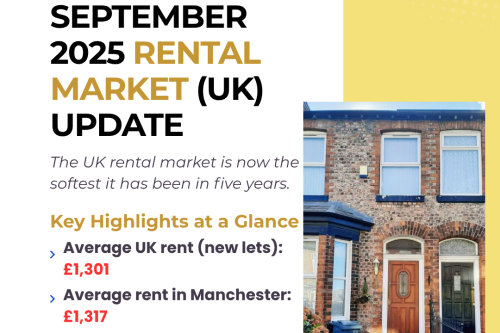- Free Valuation
- Competitive Sales Commission Fees
- Free Mortgage Advice

posted 17th October 2025
The Rental Market is Cooling After 4 Intense Years
The UK rental market is now the softest it has been in five years. As of mid-2025, letting agents are receiving 24% fewer rental enquiries compared with last year. This marks a major turning point after several years of soaring demand.
Several factors are driving this cooling:
- Improved mortgage access has encouraged more renters to purchase homes.
- Falling migration levels since 2024 have reduced tenant competition.
- More homes available for rent — listings are up by nearly 20% year-on-year.
As a result, rental growth has slowed sharply, with rents up just 2.4% annually, compared to 5.1% a year ago. The average property now takes 16 days to rent, compared with 12 days in 2023 and 20 pre-pandemic.
Manchester’s Average Rent Holds Steady at £1,317
In Manchester, the average rent reached £1,317 per month in August 2025 — slightly below the UK average of £1,348, but still among the most stable regional markets.
Manchester continues to attract professionals and students, but the pace of rental increases has eased due to:
- More properties entering the market as landlords return.
- Tenants increasingly exploring homeownership due to easing mortgage rules.
- Greater choice across city-centre apartments and suburban homes.
While London rents remain the highest (£2,253) and North East rents the lowest (£745), Manchester’s affordability and job market resilience keep it one of the most balanced rental markets in the North West.
Supply Rises as Landlords Re-Enter the Market
After years of limited stock, more landlords are now reinvesting.
The average letting agent manages 19 rental listings, compared with just 14 in 2022.
Key drivers include:
- Rental yields averaging 6% nationally, and over 7.5% in areas such as the North East and Scotland.
- 60% more buy-to-let mortgages for new purchases compared to early 2024.
- Stable mortgage rates, making investment more appealing again.
This return of landlord confidence is boosting supply — offering renters more options and slightly easing rental inflation pressures.
Demand Normalising as Affordability Challenges Remain
The affordability of renting remains a major concern for UK households.
Rents have risen by £80 per week over the past five years, adding up to around £4,100 extra per year — a steep climb amid ongoing cost-of-living pressures.
Nearly one-third of renters rely on housing benefits, which haven’t kept up with market rents, leading to affordability constraints that limit further rent increases.
Across the UK:
- North East: +9.2% annual rent inflation (highest in England)
- Yorkshire & Humber: +3.4% (lowest)
- London: +5.7%, marking nine consecutive months of slowing growth
Manchester’s rental inflation now mirrors the national trend — slower but steady, as the city’s rental stock expands and competition for tenancies cools.
Regional Rental Supply – North West Strengthens, London Lags
Rental supply has increased in every UK region except London:
- South West: +36% more homes for rent
- East Midlands: +31%
- London: +6% (the weakest growth)
London landlords face major barriers to entry, with average deposits nearing £187,000 compared to just £29,000 in the North East.
In contrast, Manchester’s lower entry cost and strong rental yields continue to attract investor interest, helping to stabilise rents and widen tenant choice.
Thinking of Renting or Investing in Manchester?
With average rents at £1,317 and strong tenant demand, Manchester remains one of the UK’s most dynamic urban rental markets.
Whether you’re a tenant seeking a new home or an investor evaluating yield opportunities, the city offers long-term stability and consistent rental performance.






